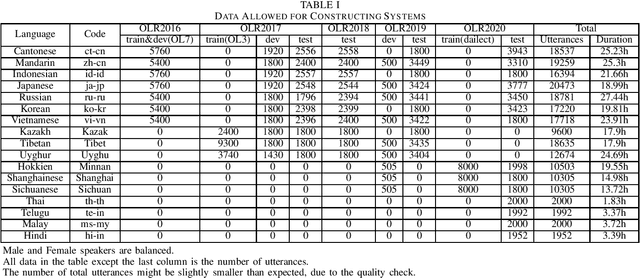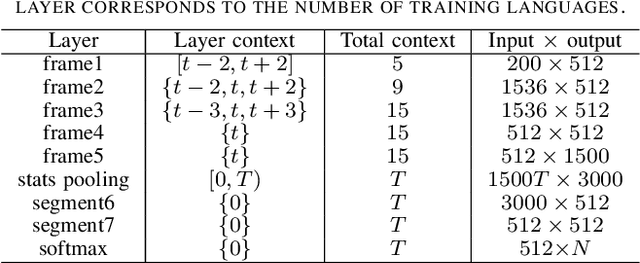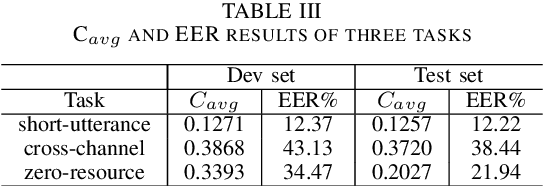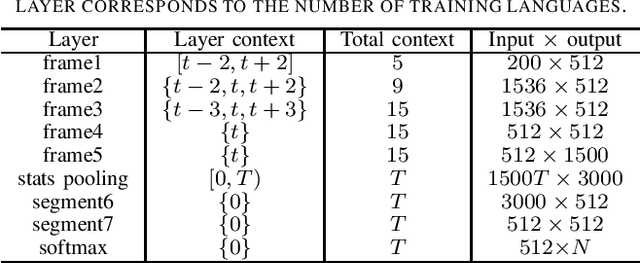Liming Song
OLR 2021 Challenge: Datasets, Rules and Baselines
Jul 23, 2021

Abstract:This paper introduces the sixth Oriental Language Recognition (OLR) 2021 Challenge, which intends to improve the performance of language recognition systems and speech recognition systems within multilingual scenarios. The data profile, four tasks, two baselines, and the evaluation principles are introduced in this paper. In addition to the Language Identification (LID) tasks, multilingual Automatic Speech Recognition (ASR) tasks are introduced to OLR 2021 Challenge for the first time. The challenge this year focuses on more practical and challenging problems, with four tasks: (1) constrained LID, (2) unconstrained LID, (3) constrained multilingual ASR, (4) unconstrained multilingual ASR. Baselines for LID tasks and multilingual ASR tasks are provided, respectively. The LID baseline system is an extended TDNN x-vector model constructed with Pytorch. A transformer-based end-to-end model is provided as the multilingual ASR baseline system. These recipes will be online published, and available for participants to construct their own LID or ASR systems. The baseline results demonstrate that those tasks are rather challenging and deserve more effort to achieve better performance.
AP20-OLR Challenge: Three Tasks and Their Baselines
Jun 04, 2020


Abstract:This paper introduces the fifth oriental language recognition (OLR) challenge AP20-OLR, which intends to improve the performance of language recognition systems, along with APSIPA Annual Summit and Conference (APSIPA ASC). The data profile, three tasks, the corresponding baselines, and the evaluation principles are introduced in this paper. The AP20-OLR challenge includes more languages, dialects and real-life data provided by Speechocean and the NSFC M2ASR project, and all the data is free for participants. The challenge this year still focuses on practical and challenging problems, with three tasks: (1) cross-channel LID, (2) dialect identification and (3) noisy LID. Based on Kaldi and Pytorch, recipes for i-vector and x-vector systems are also conducted as baselines for the three tasks. These recipes will be online-published, and available for participants to configure LID systems. The baseline results on the three tasks demonstrate that those tasks in this challenge are worth paying more efforts to achieve better performance.
AP19-OLR Challenge: Three Tasks and Their Baselines
Sep 01, 2019


Abstract:This paper introduces the fourth oriental language recognition (OLR) challenge AP19-OLR, including the data profile, the tasks and the evaluation principles. The OLR challenge has been held successfully for three consecutive years, along with APSIPA Annual Summit and Conference (APSIPA ASC). The challenge this year still focuses on practical and challenging tasks, precisely (1) short-utterance LID, (2) cross-channel LID and (3) zero-resource LID. The event this year includes more languages and more real-life data provided by SpeechOcean and the NSFC M2ASR project. All the data is free for participants. Recipes for x-vector system and back-end evaluation are also conducted as baselines for the three tasks. The participants can refer to these online-published recipes to deploy LID systems for convenience. We report the baseline results on the three tasks and demonstrate that the three tasks are worth some efforts to achieve better performance.
 Add to Chrome
Add to Chrome Add to Firefox
Add to Firefox Add to Edge
Add to Edge